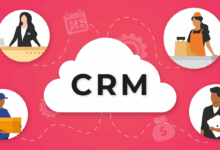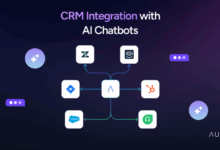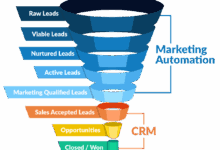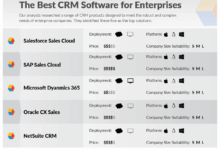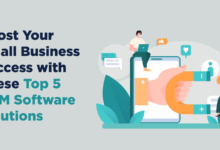AI-Powered CRM Software: A Business Revolution
AI-Powered CRM Software is transforming how businesses manage customer relationships. This technology leverages artificial intelligence to automate tasks, analyze data, and predict customer behavior, ultimately leading to improved efficiency, increased sales, and enhanced customer satisfaction. Understanding the capabilities and implications of AI-powered CRM is crucial for businesses aiming to thrive in today’s competitive landscape.
This exploration delves into the core functionalities of AI-powered CRM, examining its benefits across various business sizes and illustrating its impact through real-world case studies. We will also address potential challenges and future trends, providing a comprehensive overview of this transformative technology.
Defining AI-Powered CRM Software
AI-powered CRM software represents a significant advancement in customer relationship management, leveraging artificial intelligence to automate tasks, analyze data, and provide actionable insights that traditional CRM systems cannot. This allows businesses to improve efficiency, personalize customer interactions, and ultimately drive revenue growth.
AI-powered CRM systems are distinguished from their traditional counterparts by their ability to learn and adapt. Unlike traditional CRMs that primarily rely on manual data entry and predefined rules, AI-powered systems utilize machine learning algorithms to analyze vast amounts of customer data, identifying patterns and trends that would be impossible for humans to discern. This leads to more effective segmentation, targeted marketing, and improved customer service.
Core Functionalities of AI-Powered CRM
The core functionalities of an AI-powered CRM revolve around enhancing efficiency and providing intelligent insights. These systems typically incorporate features such as predictive lead scoring, which uses machine learning to prioritize leads based on their likelihood of conversion. Automated lead routing assigns leads to the most appropriate sales representatives based on their skills and the lead’s characteristics. AI-driven chatbots provide instant customer support, answering frequently asked questions and resolving simple issues, freeing up human agents to handle more complex problems. Finally, sentiment analysis helps gauge customer satisfaction by analyzing the emotional tone of customer interactions across various channels.
Comparison of AI-Powered CRM with Other Customer Relationship Management Solutions
AI-powered CRM solutions offer several advantages over traditional and other advanced CRM systems. Traditional CRMs often require significant manual data entry and lack the predictive capabilities of AI-powered systems. While some advanced CRMs may offer some automation, they typically lack the sophisticated machine learning algorithms that drive the insights and predictions provided by AI-powered systems. For example, a traditional CRM might track customer interactions, but an AI-powered CRM could predict the likelihood of a customer churning based on their past behavior and interactions. This predictive capability allows businesses to proactively address potential issues and retain customers more effectively. Furthermore, the advanced analytics offered by AI-powered CRMs allow for more effective marketing campaigns, personalized customer experiences, and improved sales forecasting. The difference boils down to the level of automation, intelligence, and predictive capabilities offered. A simple comparison could be made between driving a car manually versus driving a self-driving car – the latter offers a higher level of automation and intelligence, leading to a more efficient and effective journey.
Benefits of AI-Powered CRM Software
AI-powered CRM systems offer a transformative advantage for businesses of all sizes, streamlining operations and fostering stronger customer relationships. The integration of artificial intelligence enhances traditional CRM functionalities, leading to significant improvements in efficiency, productivity, and ultimately, profitability. This section will explore the key benefits, categorized by impact and illustrated with practical examples.
Advantages for Businesses of Different Sizes
Implementing an AI-powered CRM provides distinct advantages tailored to the specific needs of businesses across various scales. Small businesses benefit from streamlined processes and improved customer engagement, while larger enterprises can leverage AI to manage vast datasets and optimize complex sales funnels. The scalability and adaptability of AI-powered CRMs ensure that businesses of any size can find a solution that fits their unique requirements. For instance, a small bakery could utilize AI-powered CRM to personalize marketing emails based on customer purchase history, increasing loyalty. Conversely, a large multinational corporation could use AI to analyze massive customer data sets to predict future trends and optimize their global marketing campaigns.
Impact on Customer Satisfaction and Retention
AI-powered CRMs significantly enhance customer satisfaction and retention rates. By automating repetitive tasks, such as responding to inquiries and scheduling appointments, businesses can dedicate more time to personalized interactions. AI-driven insights into customer behavior allow for proactive support and tailored offers, fostering stronger customer relationships. For example, an AI-powered CRM might identify customers at risk of churning and trigger automated outreach from customer service representatives, proactively addressing potential issues and retaining valuable clients. The ability to provide prompt and relevant support leads to higher customer satisfaction and improved loyalty.
Improved Sales Efficiency and Lead Generation
AI-powered CRMs boost sales efficiency and lead generation through several key functionalities. AI algorithms can analyze lead data to identify high-potential prospects, prioritize sales efforts, and predict sales outcomes. Automated lead scoring and routing systems ensure that sales teams focus on the most promising leads, maximizing their time and resources. For example, an AI-powered CRM might identify leads with a high likelihood of conversion based on their online behavior and demographic data, allowing sales representatives to focus their efforts on closing these deals. Furthermore, AI-powered chatbots can handle initial customer inquiries, qualifying leads and freeing up sales representatives to focus on closing deals.
Summary of Benefits
| Benefit | Description | Impact | Example |
|---|---|---|---|
| Improved Customer Segmentation | AI analyzes customer data to create highly targeted segments for personalized marketing. | Increased conversion rates, improved campaign ROI. | A clothing retailer uses AI to segment customers based on style preferences, sending targeted email campaigns featuring relevant products. |
| Enhanced Lead Scoring and Qualification | AI algorithms automatically score and prioritize leads based on their likelihood of conversion. | Increased sales efficiency, improved sales team productivity. | A SaaS company uses AI to identify high-potential leads, allowing sales representatives to focus their efforts on closing deals. |
| Proactive Customer Service | AI identifies customers at risk of churning and triggers automated outreach to address potential issues. | Improved customer retention, increased customer lifetime value. | A telecommunications company uses AI to identify customers experiencing technical difficulties and proactively offers support. |
| Automated Marketing and Sales Processes | AI automates repetitive tasks, such as sending emails and scheduling appointments, freeing up human resources for more strategic activities. | Increased efficiency, reduced operational costs. | A real estate agency uses AI to automate email marketing campaigns, saving time and resources. |
AI Features in CRM Software
AI is rapidly transforming CRM software, moving beyond basic contact management to offer powerful predictive capabilities and personalized customer experiences. This enhanced functionality streamlines workflows, improves sales effectiveness, and ultimately drives business growth. Let’s explore the key AI features that are reshaping the CRM landscape.
Machine Learning and Customer Behavior Prediction
Machine learning algorithms analyze vast amounts of customer data—purchase history, website activity, email engagement, and more—to identify patterns and predict future behavior. This predictive power allows businesses to anticipate customer needs, personalize marketing campaigns, and proactively address potential issues. For instance, a CRM system might predict which customers are likely to churn based on their recent interactions and purchasing patterns, allowing the company to implement targeted retention strategies. The accuracy of these predictions improves over time as the system learns from new data and refines its models.
Natural Language Processing and Enhanced Customer Interactions
Natural Language Processing (NLP) enables CRM systems to understand and respond to human language. This allows for more natural and efficient interactions with customers through various channels. For example, NLP can power chatbots that provide instant support, answer frequently asked questions, and even qualify leads. It can also analyze customer feedback from surveys and social media to identify trends and sentiment, providing valuable insights for improving products and services. A company could use NLP to analyze customer reviews, identifying recurring complaints about a specific product feature, leading to targeted improvements.
Predictive Analytics in Sales Forecasting and Lead Scoring
Predictive analytics, powered by AI, leverages historical data and machine learning to forecast future sales performance and prioritize leads. By analyzing factors like lead demographics, engagement levels, and past purchase behavior, the system can assign a score to each lead, indicating the likelihood of conversion. This allows sales teams to focus their efforts on the most promising leads, increasing conversion rates and improving overall sales efficiency. For example, a company selling software might use predictive analytics to identify leads with a high probability of purchasing a premium subscription based on their engagement with free trial features.
AI Features and Functionalities
The integration of AI significantly enhances the capabilities of CRM software. Here are some key AI features and their functionalities:
- Lead Scoring and Prioritization: Automatically ranks leads based on their likelihood of conversion, allowing sales teams to focus on high-potential prospects.
- Sales Forecasting: Predicts future sales revenue based on historical data and market trends, enabling better resource allocation and strategic planning.
- Customer Segmentation: Groups customers based on shared characteristics and behaviors, enabling targeted marketing campaigns and personalized experiences.
- Churn Prediction: Identifies customers at risk of churning, allowing for proactive retention efforts and improved customer loyalty.
- Personalized Recommendations: Suggests products or services to customers based on their past purchases and preferences, increasing sales and customer satisfaction.
- Intelligent Chatbots: Provides instant customer support, answers frequently asked questions, and qualifies leads, improving customer service efficiency.
- Sentiment Analysis: Analyzes customer feedback to understand their opinions and sentiment towards products and services, enabling data-driven improvements.
Implementation and Integration of AI-Powered CRM
Implementing AI-powered CRM software requires a strategic approach that considers your business needs and existing infrastructure. A successful integration ensures seamless data flow and maximizes the benefits of AI capabilities. Careful planning and execution are crucial for a smooth transition and optimal return on investment.
Successful implementation involves a phased approach, beginning with a thorough assessment of your current CRM system and business processes. This assessment identifies areas ripe for AI enhancement and helps determine the specific features and functionalities needed. Subsequently, a robust integration strategy is developed, accounting for data migration, user training, and ongoing support. This ensures a smooth transition and minimizes disruption to daily operations.
Steps Involved in Implementing AI-Powered CRM Software
Implementing AI-powered CRM involves several key steps. First, a thorough needs assessment is conducted to determine the specific AI features required. This is followed by the selection and procurement of suitable software, which includes evaluating various vendors and solutions. Next, data migration from existing systems is performed, ensuring data integrity and consistency. Then, the system is configured and customized to meet specific business requirements. Finally, comprehensive training for users is provided to ensure effective adoption and utilization of the new system. Ongoing monitoring and optimization are crucial to maximize the system’s effectiveness and adapt to evolving business needs.
Integration Process with Existing Business Systems
Integrating AI-powered CRM with existing systems requires a well-defined strategy. This involves mapping data flows between the AI-powered CRM and other systems such as ERP, marketing automation platforms, and e-commerce solutions. API integrations are frequently used to facilitate seamless data exchange. Data transformation and cleansing may be necessary to ensure compatibility between different systems. Robust security measures must be implemented to protect sensitive customer data. Finally, regular testing and monitoring are crucial to ensure the integration remains stable and efficient.
Examples of Successful AI-Powered CRM Integrations
A leading e-commerce company integrated its AI-powered CRM with its order management system to predict customer churn and proactively offer retention incentives. This resulted in a significant reduction in customer attrition. Another example is a financial institution that integrated its AI-powered CRM with its fraud detection system. This allowed for real-time identification and prevention of fraudulent transactions, significantly reducing financial losses. A healthcare provider successfully integrated its AI-powered CRM with its patient portal, enabling personalized communication and improved patient engagement. This resulted in increased patient satisfaction and improved health outcomes.
Step-by-Step Guide for Integrating AI-Powered CRM into a Company’s Workflow
- Needs Assessment: Define specific business challenges and goals that AI-powered CRM can address. Identify key performance indicators (KPIs) to measure success.
- Software Selection: Evaluate different AI-powered CRM solutions based on features, scalability, and integration capabilities. Consider factors like cost, vendor support, and security.
- Data Migration: Plan and execute the migration of existing customer data from legacy systems to the new AI-powered CRM. Ensure data integrity and consistency throughout the process.
- System Configuration: Customize the AI-powered CRM to match specific business processes and workflows. Configure AI features like lead scoring, predictive analytics, and automated workflows.
- User Training: Provide comprehensive training to users on how to effectively utilize the new AI-powered CRM system. This includes hands-on training and ongoing support.
- Integration Testing: Thoroughly test the integration of the AI-powered CRM with existing systems. Identify and resolve any issues before full deployment.
- Deployment and Monitoring: Deploy the AI-powered CRM system and continuously monitor its performance. Track KPIs and make adjustments as needed to optimize its effectiveness.
Case Studies of AI-Powered CRM Success
The following case studies illustrate how AI-powered CRM systems have delivered significant improvements across various business metrics for different organizations. These examples showcase the tangible benefits achievable through strategic implementation and highlight the versatility of AI in addressing diverse business challenges.
Salesforce Implementation at a Retail Giant
This case study focuses on a large retail chain that implemented Salesforce’s Einstein AI features into their existing CRM system. Facing challenges in lead qualification and sales forecasting accuracy, the retailer sought to improve efficiency and boost sales conversion rates.
The company, a multinational retailer with thousands of sales associates and a massive customer base, struggled with inefficient lead management. Sales teams were spending excessive time qualifying leads, leading to lost opportunities and reduced sales. Their existing CRM system lacked the intelligence to prioritize high-potential leads, resulting in inconsistent sales performance across different regions. They implemented Salesforce Einstein, leveraging its AI-powered lead scoring and predictive analytics capabilities. Einstein’s algorithms analyzed historical sales data, customer interactions, and website behavior to identify high-probability leads and predict future sales trends with greater accuracy. This resulted in a 25% increase in sales conversion rates within six months, a 15% reduction in sales cycle length, and a 10% improvement in sales forecasting accuracy. The company also reported a significant increase in sales team productivity, freeing up valuable time for focusing on high-value prospects.
Improved Customer Service with AI-Powered Chatbots at a Telecom Provider
A major telecommunications company integrated AI-powered chatbots into their customer service platform to handle a large volume of routine inquiries, freeing up human agents to focus on more complex issues.
This telecom provider faced escalating customer service costs due to high call volumes and long wait times. Many customer inquiries were repetitive and could be easily automated. They implemented an AI-powered chatbot integrated with their CRM system. The chatbot was trained on a vast database of FAQs and customer interactions, enabling it to handle common inquiries such as billing questions, technical support requests, and account updates. The results were remarkable. The company experienced a 40% reduction in call center wait times, a 30% decrease in customer service costs, and a 15% improvement in customer satisfaction scores. The chatbot’s ability to provide instant, accurate answers improved the overall customer experience, leading to increased customer loyalty.
Enhanced Marketing Campaign Effectiveness with AI-Driven Personalization at a Financial Institution
A large financial institution used AI-powered CRM to personalize marketing campaigns, leading to improved customer engagement and higher conversion rates.
This financial institution struggled with low engagement rates in their marketing campaigns. Their generic marketing materials failed to resonate with specific customer segments, resulting in wasted resources and poor return on investment (ROI). They integrated AI-powered features into their CRM, enabling them to segment their customer base based on demographics, behavior, and financial profiles. AI algorithms then personalized marketing messages and offers tailored to individual customer needs and preferences. This resulted in a 20% increase in email open rates, a 15% rise in click-through rates, and a 10% improvement in lead generation. The personalized approach fostered stronger customer relationships, leading to increased brand loyalty and improved customer lifetime value.
Challenges and Considerations
Implementing AI-powered CRM software offers significant advantages, but it’s crucial to acknowledge and proactively address potential challenges to ensure a successful deployment and maximize ROI. Ignoring these hurdles can lead to wasted resources and unmet expectations. This section outlines key challenges and provides strategies for mitigation.
Data Privacy and Security Concerns
The integration of AI into CRM systems necessitates the processing of vast amounts of sensitive customer data. This raises significant concerns regarding data privacy and security. Breaches can lead to legal ramifications, reputational damage, and loss of customer trust. Robust security measures, including data encryption, access controls, and compliance with regulations like GDPR and CCPA, are paramount. Regular security audits and employee training on data protection best practices are also essential. Furthermore, adopting a privacy-by-design approach, where data protection is integrated into every stage of the system’s development and deployment, is vital.
Data Quality Requirements for Optimal AI Performance
AI algorithms are only as good as the data they are trained on. Inaccurate, incomplete, or inconsistent data will lead to flawed predictions and recommendations, ultimately hindering the effectiveness of the AI-powered CRM. Data cleansing, validation, and standardization are crucial steps before implementing AI. This includes identifying and correcting errors, handling missing values, and ensuring data consistency across different sources. Investing in data quality management tools and processes is essential for maximizing the value of AI in CRM. For example, a CRM system relying on inaccurate sales data for predictive modeling will generate unreliable sales forecasts, leading to poor resource allocation and missed opportunities.
Addressing Integration and Implementation Challenges
Integrating AI-powered CRM software with existing systems can be complex and time-consuming. Compatibility issues, data migration challenges, and the need for specialized technical expertise can create significant hurdles. Careful planning, thorough assessment of existing infrastructure, and a phased implementation approach can mitigate these challenges. Selecting a vendor with a proven track record of successful integrations and providing adequate training for employees are also crucial. For instance, a poorly planned migration of customer data from a legacy system to a new AI-powered CRM can result in data loss, system downtime, and disruptions to business operations.
Mitigating Risks Associated with AI Bias and Explainability
AI algorithms can inherit and amplify biases present in the training data, leading to unfair or discriminatory outcomes. Ensuring fairness and transparency in AI-powered CRM systems requires careful attention to data selection, algorithm design, and ongoing monitoring for bias. Additionally, the lack of explainability in some AI models can make it difficult to understand how decisions are made, hindering trust and accountability. Techniques like explainable AI (XAI) can help address this issue by providing insights into the decision-making process. For example, an AI-powered CRM system trained on biased data might unfairly prioritize certain customer segments, leading to unequal service levels and potentially legal issues.
Future Trends in AI-Powered CRM
The landscape of AI-powered CRM is constantly evolving, driven by advancements in machine learning, natural language processing, and big data analytics. We’re moving beyond basic automation towards increasingly sophisticated systems that anticipate customer needs and proactively address potential issues. This evolution promises to significantly reshape customer interactions and business strategies.
The coming years will witness a convergence of AI capabilities within CRM, creating more intelligent and personalized customer experiences. This will be achieved through the integration of diverse technologies and a focus on improving data analysis and predictive modeling.
Hyper-Personalization at Scale
AI will power a new level of hyper-personalization, moving beyond simple segmentation. CRM systems will leverage advanced machine learning algorithms to analyze vast datasets—including purchase history, website interactions, social media activity, and even sentiment analysis of customer communications—to create truly individual customer profiles. This will allow businesses to tailor marketing messages, product recommendations, and customer service interactions with unprecedented precision, leading to higher conversion rates and stronger customer loyalty. For example, an e-commerce platform might use AI to predict a customer’s next purchase based on their browsing history and offer personalized discounts or product bundles.
Predictive Customer Service
AI will play a crucial role in enhancing customer service by predicting potential issues and proactively addressing them. For instance, sophisticated CRM systems might analyze customer data to identify individuals at high risk of churn, enabling proactive outreach to retain them. Similarly, AI-powered chatbots will become increasingly adept at understanding complex customer queries and providing accurate and timely solutions, reducing the need for human intervention in many cases. Imagine a telecommunications company using AI to predict potential service outages in specific areas and proactively notify affected customers, mitigating frustration and improving service reputation.
Enhanced Sales Intelligence
AI will transform sales processes by providing sales teams with actionable insights. CRM systems will leverage AI to identify high-potential leads, predict deal closure probabilities, and recommend optimal sales strategies. This will improve sales efficiency, increase conversion rates, and ultimately drive revenue growth. For example, a B2B software company might use AI to analyze prospect company data and identify those most likely to be interested in their product, allowing sales representatives to focus their efforts on the most promising leads.
The Future Landscape of AI-Powered CRM
Imagine a visual representation: A central hub, representing the CRM system, glows with interconnected nodes. These nodes represent various AI capabilities—predictive analytics, natural language processing, machine learning, and robotic process automation—each pulsating with activity. Data streams, visualized as vibrant lines of light, flow into and out of the central hub, representing the constant flow of information from various sources. The overall image conveys a sense of dynamic interconnectedness and intelligent automation, showcasing how AI will power a seamless and highly personalized customer journey. The visual emphasizes the seamless integration of diverse AI capabilities, highlighting the sophisticated analysis and prediction powering the entire system, and showcasing a dynamic and responsive system capable of adapting to changing customer needs in real-time.
Last Recap
In conclusion, AI-powered CRM software offers a powerful suite of tools to optimize customer interactions and drive business growth. While challenges exist, the potential benefits – from enhanced lead generation and improved sales forecasting to increased customer retention and personalized experiences – significantly outweigh the risks for businesses willing to embrace this innovative technology. The future of CRM is undeniably intertwined with the advancements in AI, promising even more sophisticated and impactful solutions in the years to come.
